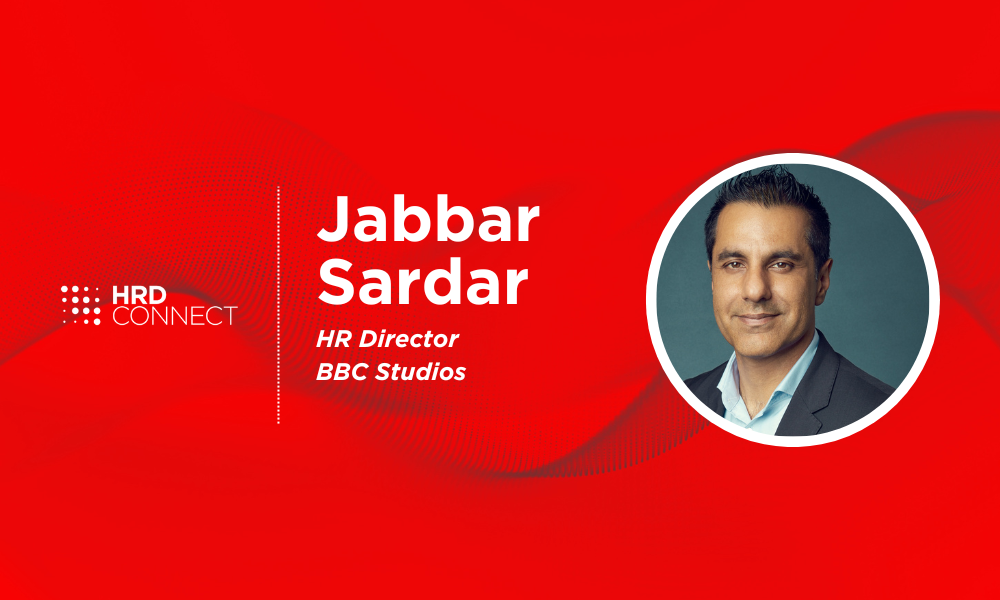Empowerment philosophy at BBC Studios: Putting theory into practice
- 7 Min Read
Jabbar Sardar, HR Director at BBC Studios, outlines a five-stage philosophy that can help businesses drive high levels of engagement and capability within the workforce as well as practical illustrations of implementing the principles at BBC Studios.
- Author: Jabbar Sardar
- Date published: May 9, 2023
- Categories

As all HR professionals know, businesses are nothing without their people. But how do organizations develop their workforce to help them thrive and grow, particularly in a post-Covid world? For Jabbar Sardar, HR Director at BBC Studios, the answer is empowerment: trusting staff to act with autonomy and developing high performance in the workforce.
In his article, Sardar outlines a five-stage philosophy that can help a business drive high levels of engagement and capability within the workforce. This results not only staff development and happiness, but organizational growth. Alongside this, he offers insights into what organizations need to consider when employing the philosophy to ensure successful outcomes. Sardar concludes by a practical illustration of how implementing the principles at BBC Studios has started the journey of empowerment, delivered impressive results already and laid the foundation for the business’ future growth.
Introduction
Entrepreneur Mary Kay Ash’s comment that “A company is only as good as the people it keeps” is music to the ears of any HR professional. It is people – far more than transactions or products – that play a fundamental role in the success of any business.
So, in a post-Covid world – where employees are reassessing what is important to them – how do businesses develop their workforce to help them thrive and grow? The answer is empowerment: trusting staff to act with autonomy and developing high performance in the workforce, resulting in high levels of staff engagement and capability, which in turn fuels organizational growth.
Five principles to building empowerment
At BBC Studios, the commercial arm of the UK’s public service broadcaster the BBC, we have identified five principles that we believe businesses need to adopt in order to build a philosophy of empowerment within the workforce. While I recognize that no two organizations are alike, the overarching principles below are broad enough that they can be adapted, no matter what sector you work in.
The first principle – as obvious as it sounds – is to get those people that ‘influence’ the business – ie leaders – on side. Their support in scene setting and providing a framework for success is critical, so it is imperative for organizations to develop engaged and capable leaders so that they can in turn empower their teams to perform at their best. In so doing, leaders establish a clear strategic direction for their area and set the standard of behaviors. Anecdotal evidence suggests that a watershed moment in organizational change like this occurs when a critical mass of line managers is sufficiently engaged and capable enough to unlock the potential for the whole organization. In order to do that, a business needs to provide people leaders with clarity on what is expected of them and how they contribute to the growth of the business.
Embedding a culture of learning and growth within teams – and thereby building capabilities for the future – is the second principle for empowerment. Organizations need to understand and actively introduce and manage those capabilities that underpin growth and build a high-performance culture, allowing individuals to take ownership for their own development, personal growth and careers.
Businesses, particularly large organizations, can often be caught up in bureaucracy or with intricate systems that once served a purpose, but which can also clog up the ability to move swiftly. So a third step of our philosophy is to simplify structures and reduce complexity so that people can focus on the right things. That involves making policies, processes, systems and governance simpler. Any organizational structures need to ensure effectiveness and clear accountability to enable growth, bearing in mind that it requires a fine balance between letting go of control while still maintaining standards of delivery.
Beyond organizational changes, businesses need to focus on their people – and this is the fourth pillar of our philosophy. Successful companies engender a sense of belonging in their workforce and do so through encouraging inclusion and inclusive behaviors. By placing inclusion at the heart of the business, where everyone can be their best selves, it encourages people to do their best work. That requires building awareness and understanding, delivered through storytelling, sharing and encouraging openness. By improving representation at all levels of the organization the workforce sees people like them and are encouraged to reach their potential by example.
Finally, employees need to thrive. Feeling a sense of belonging contributes to the overall employee experience, but organizations can elevate this by increasing engagement and improving wellbeing for everyone. That means being relentless in listening, understanding and responding to ways to improve the experience for individuals. It also means addressing the issues raised and finding solutions, as well as catering for individual needs rather than adopting a one-size-fits-all approach. Creating a culture that enables people to ask for help when they are not thriving, and to support people in challenging times, is central to generating an environment in which employees feel they are being invested.
Practical considerations
In order to implement this philosophy effectively, there are some practical considerations that the HR department needs to put into place. First amongst these is to invest time and energy with the C-suite, who need to agree with the ambition of the plan and visibly and consistently role-model the critical skills and behaviors underpinning it in order to instill trust and confidence. The business also needs to agree to prioritize those initiatives that increase levels of engagement and build capability.
It is also worth considering what – and how many – pilot schemes you are going to introduce. Running a number of experiments concurrently, allows businesses to analyze data at the same time and reach conclusions about what does and doesn’t work faster. However, multiple pilots will need to be managed and requires an air traffic control process to track activities, manage the interdependencies between them and control the progress being made against its ambitions.
Another useful consideration for the HR department is to determine what activity is already taking place within the business that delivers against the ambition of change and to embrace and exemplify this activity as part of a regular test-and-learn approach.
Putting the theory into practice
BBC Studios’ success rests on delivery of creative ideas of the highest quality, and to do this we must have a truly diverse and inclusive workforce where everyone feels valued, motivated and empowered to succeed.
The business has taken its first steps into putting the philosophy of empowerment into practice by introducing Putting People First, whereby we are working actively to build a diverse and inclusive culture that supports and encourages its people to thrive, be their authentic selves and do their very best work. Support ranges from dedicated training for all, initiatives to improve leadership, career coaching and the opportunity to manage individual working journeys through to access to wellbeing support.
It also includes the BBC Studios Productions Leaders Playbook, which supports the company’s leaders, and in turn helps them support their teams effectively. This manual sets out what the company expects from those in leadership roles, driven by their commitment to LEAD – Leadership, Empowerment, Accountability and Development – and sets the tone for leaders to have productive and constructive relationships with their staff.
Our philosophy for empowerment is already starting to deliver. According to our latest staff survey, 90% of staff agree they are proud to work at BBC Studios; four in five employees say they would recommend the BBC as a place to work; and 72% of our workforce agree that their leaders demonstrate that people are important to the organization’s success.
BBC Studios is now looking to build on the work of Putting People First with the imminent launch of our new four-year People Plan. Taking us through to 2026, this plan will take forward our Philosophy of Empowerment, and we’re excited to see how our plans will help us deliver against our ambition to significantly increase income over the next five years.
___
Jabbar Sardar is HR Director for BBC Studios, where he oversees all HR activities to support the business strategy. Before joining BBC Studios in 2016, Jabbar was Director of HR & OD at the Children and Family Court Advisory and Support Service (Cafcass) for over 10 years, where he led a program of transformational cultural change, building employee engagement, lowering sickness levels and establishing high standards of wellbeing.








